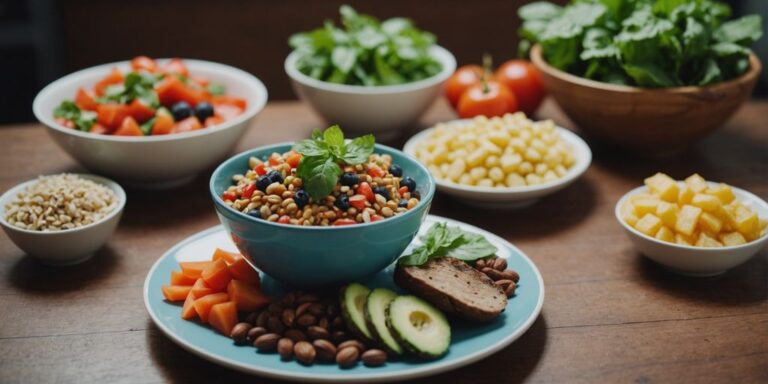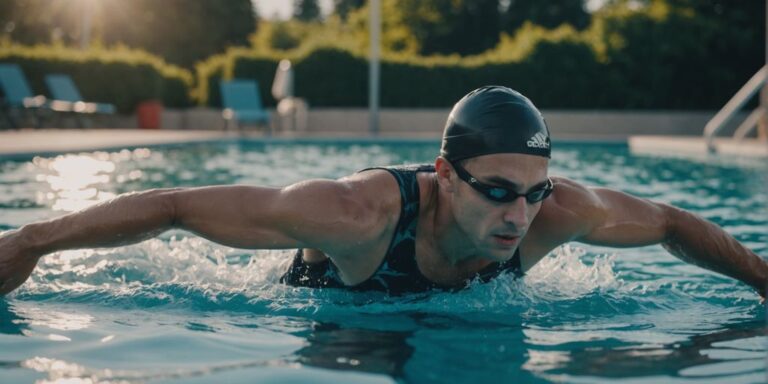Optimized food for a marathon runner
Are you gearing up for a marathon and wondering how to fuel your body for peak performance? Your diet is key to your success in long-distance running. In this article, we’ll show you how to eat right to become a top athlete.
Key Takeaways
- Marathon runners need a balanced diet of whole grains, fruits, vegetables, lean proteins, and healthy fats.
- Proper hydration is just as important as eating the right foods for marathon training.
- Carbohydrates are the main fuel source for marathon runners, while proteins help with muscle recovery.
- Planning your meals before the marathon can help you avoid foods that might upset your stomach on race day.
- Supplements can be useful, but it’s best to rely on natural foods to meet your nutritional needs.
Understanding Marathon Runners’ Food Needs
Why Nutrition Matters for Marathon Runners
Running a marathon? Here are the nutrition tips to know. Basically, you need to meet all your normal nutritional needs, and then some. During marathon training, it’s important to add in extra carbohydrates as well as proteins and fats to fuel your body. Proper nutrition helps you run longer, recover faster, and avoid injuries.
Common Nutritional Mistakes
Many runners make the mistake of not eating enough. They think less food means less weight to carry. But this can lead to low energy and poor performance. Another common mistake is not drinking enough water. Dehydration can cause cramps and slow you down. Lastly, skipping meals or snacks can leave you feeling tired and weak.
The Role of Hydration
Hydration is key for any runner. When you run, you lose water through sweat. If you don’t replace it, you can get dehydrated. Drink water before, during, and after your run. Sports drinks can also help replace lost electrolytes. Aim to drink small amounts regularly rather than a lot at once.
Remember, good nutrition and hydration are just as important as your training runs. They help you perform your best and stay healthy.
Essential Macronutrients for Marathon Training
Carbohydrates: The Primary Fuel
Carbohydrates are the body’s main fuel source. For marathon runners, they are crucial because they provide the energy needed to keep going. Highly active individuals and athletes typically have higher needs for carbohydrates compared to less active people. Good sources of carbohydrates for marathoners include fruits, vegetables, rice, pasta, potatoes, and cereals.
Proteins for Muscle Recovery
Protein is important for muscle repair and maintenance after running. Runners need both carbs and protein. Including lean proteins like chicken, fish, and beans in your diet can help your muscles recover faster and stay strong.
Healthy Fats for Sustained Energy
Healthy fats are another essential part of a marathon runner’s diet. They provide sustained energy and help the body use carbohydrates more efficiently. Good sources of healthy fats include avocados, nuts, seeds, and olive oil.
A well-balanced diet with the right mix of macronutrients can make a big difference in your marathon performance. Make sure to include a variety of foods to meet your nutritional needs.
Best Foods to Include in Your Marathon Diet

When training for a marathon, it’s crucial to choose the right foods to fuel your body. Nutrient-dense foods are your best friends here. You can’t expect to perform well on a diet of soda and donuts. Instead, focus on a balanced diet that includes whole grains, fruits, vegetables, lean proteins, and healthy fats.
Creating a Pre-Marathon Meal Plan
Preparing for a marathon isn’t just about the miles you run; it’s also about what you eat. A well-thought-out meal plan can make a big difference in your performance on race day. Let’s dive into how to create an effective pre-marathon meal plan.
Timing Your Meals
When it comes to eating before a marathon, timing is everything. Aim to have your last big meal about 3-4 hours before the race. This gives your body enough time to digest and convert food into energy. 1-2 hours before your run, consider eating a larger afternoon snack like a banana with peanut butter and a glass of milk. Or, think about eating an early dinner the night before.
Sample Pre-Marathon Breakfast
A good pre-marathon breakfast should be rich in carbohydrates and easy to digest. Here’s a simple example:
- Oatmeal with honey and a sliced banana
- A slice of whole-grain toast with almond butter
- A glass of orange juice
This meal provides a good mix of carbs, a bit of protein, and some healthy fats to keep you fueled.
Foods to Avoid Before the Race
Not all foods are created equal, especially before a marathon. Avoid foods that are high in fiber, fat, or are overly spicy. These can cause digestive issues and make your run uncomfortable. Also, steer clear of new foods that you haven’t tried before; stick to what your body knows and tolerates well.
Remember, the goal is to feel light and energized, not weighed down or bloated. Make smart food choices to set yourself up for success on race day.
Race Day Nutrition Strategies
Hydration Tips for Marathon Day
Staying hydrated is crucial for marathon success. Start hydrating the day before the race by drinking plenty of water. On race day, drink small amounts of water regularly rather than gulping down large quantities at once. This helps maintain your energy levels and prevents dehydration.
Quick Energy Snacks
Having the right snacks can make a big difference. Opt for fast-acting carbs like energy gels, bananas, or sports drinks. These provide a quick energy boost without weighing you down. Remember, learning what to eat before a race can seem confusing—but we make it simple.
Post-Race Recovery Foods
After crossing the finish line, your body needs to recover. Focus on foods rich in protein and carbs to help repair muscles and replenish energy stores. Good options include chocolate milk, a turkey sandwich, or a smoothie with protein powder.
Packing everything you need a few days before can help you avoid forgetting important items and ensure a smooth race day.
Adjusting Your Diet for Training Phases

Nutrition for High-Intensity Training Days
When you’re pushing your limits with high-intensity training, your body needs more fuel. Carbohydrates are your best friend during these days. They help keep your energy levels up and your muscles working efficiently. Aim to eat nutrient-dense, carbohydrate-rich foods like wholegrain breads, cereals, starchy vegetables, and fruits. This helps your muscles use fat and carbohydrates better, saving your glycogen stores for those tough hill climbs and sprint finishes.
Eating on Rest Days
Rest days are just as important as training days. On these days, you can dial back your carbohydrate intake since your energy needs are lower. Focus on balanced meals with lean proteins, healthy fats, and plenty of vegetables. This helps your body recover without adding unnecessary calories.
Adapting to Different Training Loads
Your diet should change with your training load. On days with heavy training, you might need extra snacks like sports drinks or energy gels to keep your performance up. On lighter days, stick to your main meals to promote recovery. Timing your meals around your training sessions can also help you get the most out of your food.
Remember, adjusting your diet according to your training phases can make a big difference in your performance and recovery. It’s all about giving your body what it needs, when it needs it.
Supplements and Marathon Running
Supplements aren’t always necessary for marathon training, but they can help fill in the gaps in your diet. It’s best to talk to a nutritionist to figure out what you need. Here are some common supplements runners use:
Common Supplements for Runners
- Carbohydrate gels: These are great for quick energy during long runs.
- Electrolyte tablets: They help replace the salts you lose when you sweat.
- Whey protein: A protein shake after running can give you a recovery boost.
- Vitamin D3: This is especially important during the winter months.
- Omega-3: These fatty acids can help reduce inflammation.
When to Use Supplements
Timing is key when it comes to supplements. For example, you might take carbohydrate gels during a long run or have a protein shake right after your workout. Electrolyte tablets can be added to your water bottle to sip on throughout your run.
Natural Alternatives to Supplements
If you prefer to go the natural route, there are plenty of options. Instead of carbohydrate gels, you can eat bananas or dates. Coconut water is a natural source of electrolytes. For protein, consider foods like chicken, fish, or beans.
Remember, every runner is different. What works for one person might not work for another. Always listen to your body and adjust your diet and supplements as needed.
Conclusion
In the end, eating right is a game-changer for marathon runners. A balanced diet full of carbs, proteins, healthy fats, vitamins, and minerals can make a big difference in how you perform and recover. It helps reduce soreness, speeds up muscle repair, and boosts your overall energy. Remember, everyone is different, so it’s smart to talk to a nutritionist to find out what works best for you. Stick to your plan, and you’ll be crossing that finish line feeling strong and proud.
Frequently Asked Questions
Why is nutrition important for marathon runners?
Nutrition is key for marathon runners because it fuels their bodies, helps with recovery, and boosts endurance. Eating the right foods can make a big difference in performance.
What are common nutritional mistakes marathon runners make?
Some common mistakes include not eating enough carbs, skipping meals, and not staying hydrated. These can lead to low energy levels and poor performance.
How important is hydration for marathon runners?
Hydration is very important for marathon runners. Dehydration can lead to fatigue, cramps, and other health issues. It’s crucial to drink enough water before, during, and after a run.
What should I eat before a marathon?
Before a marathon, it’s best to eat a meal rich in carbs, moderate in protein, and low in fat. Foods like oatmeal, bananas, and whole-grain toast are good choices.
Are supplements necessary for marathon runners?
Supplements are not always necessary if you have a balanced diet. However, some runners use them to fill nutritional gaps. It’s best to talk to a nutritionist before starting any supplements.
What foods should I avoid before a race?
Avoid foods that are high in fat, fiber, or are hard to digest. These can cause stomach issues during the race. Stick to simple, easy-to-digest foods.







